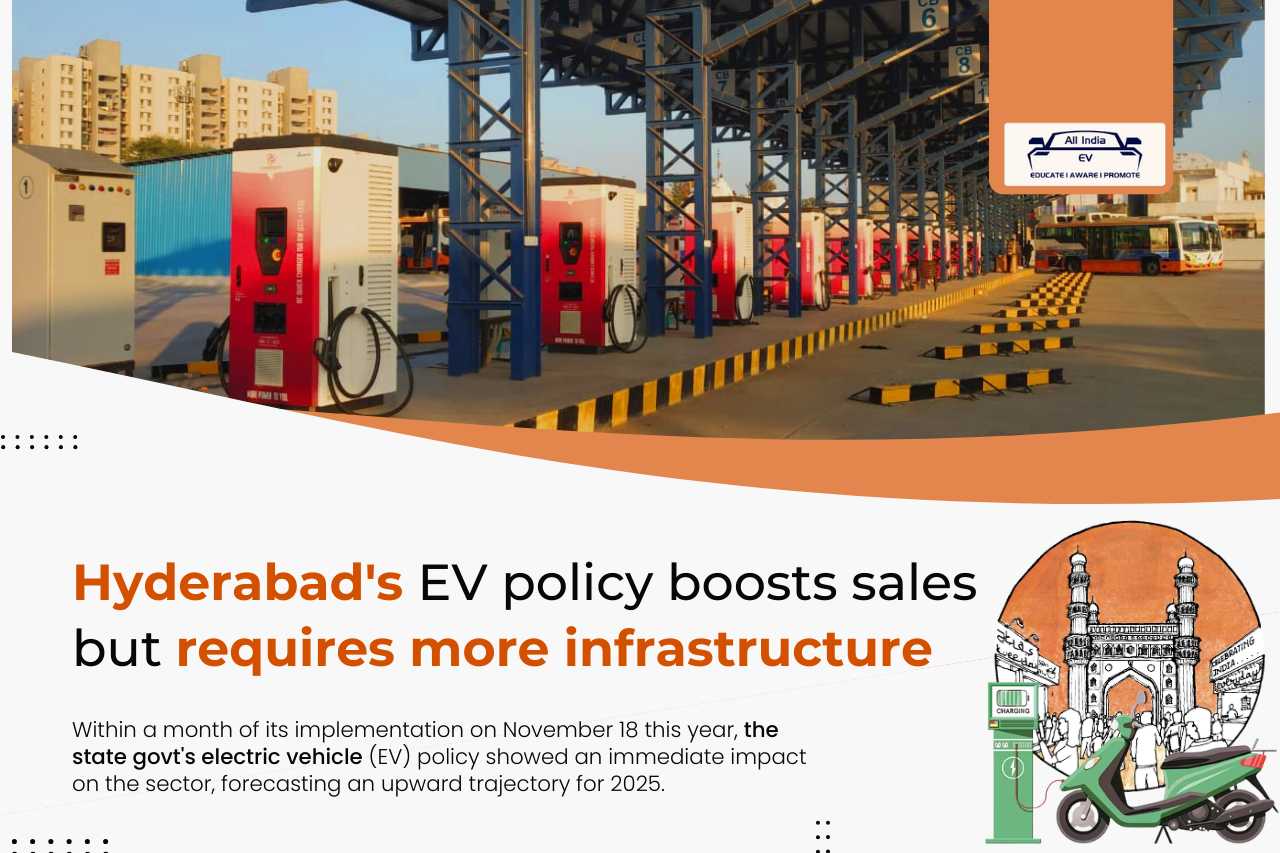
Hyderabad’s EV Policy Sparks Sales Surge, But Infrastructure Lags Behind
Hyderabad – The Telangana government’s electric vehicle (EV) policy, implemented on November 18th, has demonstrated a swift and significant impact on the sector, signaling a promising trajectory for 2025. While the policy, which includes a 100% waiver of road taxes and registration charges, has undeniably boosted EV sales, experts emphasize the critical need for a robust charging infrastructure to fully realize the policy’s potential and address concerns about range anxiety among potential buyers.
- Hyderabad’s EV Policy Sparks Sales Surge, But Infrastructure Lags Behind
- Sales Surge Across Segments:
- Projected Growth and Ranking:
- Charging Infrastructure: A Pressing Need
- Concerns Over Price Manipulation:
- Attracting OEMs and Expanding the Market:
- Government Initiatives and Fleet Electrification:
- Conclusion:
Sales Surge Across Segments:
Data from the Regional Transport Authority (RTA) reveals a dramatic increase in EV registrations since the policy’s implementation. Between November 18th and December 18th, 1,008 electric cars were registered in Telangana, a threefold increase compared to the 345 registrations during the same period in the previous year. This upward trend is evident across segments, with three-wheeler registrations surging from 30 to 138 and two-wheeler registrations skyrocketing from 1,800 to 3,704 during the same period.
Projected Growth and Ranking:
If this growth trajectory continues, Telangana is poised to add approximately 60,000 new EVs in 2025, bringing the total number of EVs in the state to 2.3 lakh. This would solidify Telangana’s position among the top five states in EV registrations, following Uttar Pradesh, Maharashtra, Karnataka, and Tamil Nadu. Currently, the state hosts 1.7 lakh EVs, comprising 1.3 lakh two-wheelers and 12,765 cars.
Charging Infrastructure: A Pressing Need
“Considering the current growth rate of electric vehicles, we anticipate a massive surge in EV registrations in 2025,” stated a senior official at the RTA. “The industry holds immense potential for reducing pollution levels, but the establishment of a robust charging infrastructure is imperative. We need to see a significant increase in the number of charging stations across Hyderabad, particularly along the Outer Ring Road (ORR) and major highways, to alleviate range anxiety and instill confidence in potential EV buyers.”
Concerns Over Price Manipulation:
Authorities are also taking steps to prevent unethical practices, such as artificial price increases by EV manufacturers or dealers seeking to capitalize on the government incentives. “It is crucial to establish a monitoring authority to closely examine EV pricing patterns before and after the implementation of the tax waiver to identify any unreasonable price increases,” emphasized the RTA official.
Attracting OEMs and Expanding the Market:
Experts believe that the revised policy, coupled with expanding infrastructure and growing public acceptance, will attract Original Equipment Manufacturers (OEMs) to venture beyond the current focus on two-wheelers and three-wheelers. “The year 2025 appears promising for Telangana’s EV sector,” said N Venu Gopal Rao, an independent EV ecosystem consultant. “Established manufacturers can expand their product range by introducing new models with localized components and technology. This will enable traditional OEMs to transition their existing models to electric versions, broadening their offerings while maintaining their brand recognition.”
Government Initiatives and Fleet Electrification:
The government is actively encouraging fleet operators, such as auto-rickshaw and taxi services, to transition to EVs by offering them special incentives. The Telangana State Road Transport Corporation (TSRTC) also plans to introduce 500 electric buses in 2025, further bolstering the state’s commitment to sustainable transportation.
Conclusion:
The Telangana government’s EV policy has undoubtedly ignited a surge in EV sales. However, the success of this initiative hinges on the timely development of a robust and accessible charging infrastructure. By addressing this critical need and ensuring fair pricing practices, the government can further accelerate EV adoption and position Telangana as a leader in sustainable transportation.









